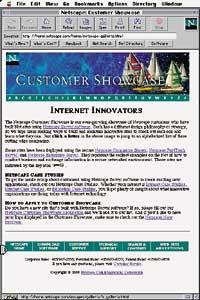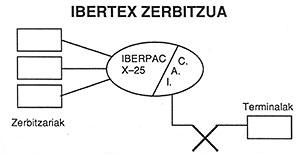INTERNET Another approach
1996/10/01 González Abascal, Julio Iturria: Elhuyar aldizkaria

It seems that all the media have become apologists for the new religion. The bombardment of news about the Internet is, in most cases, fascinating. The message is: “In the future everything will happen in the network. If you’re not cyber, you’re out.” As a user I am convinced that the Internet is a very useful tool for some applications. We must not repeat here the advantages of this tool, since we have many news in newspapers, radios and televisions. For example, we all know that the Internet is a “network of networks” through which it is possible to use the telematic services offered at the other end of the world or to contact any other.
However, we do not understand well the new opportunities that are often so exalted. We often stay with the slogan “well, but...” after receiving this kind of news. Despite its low frequency, it is true that on the Internet some problematic aspects are mentioned occasionally. For example, problems such as pornography/censorship and piracy/security have been raised, even though many times the analysis has not been exhaustive and have only served to reinforce the myth of the Internet. In this way, the consumption of the Internet has been strengthened until becoming fashion. Any social event (concert, inauguration...) Offer internet navigation terminals to be modern.
Numerous experts announce the changes of the world through the Internet. There will be no newspapers or books in the future. It will not be necessary to attend class. School, work, leisure, shopping... will be carried out from home by telematic terminals. While this future is possible, in most cases these prospects are nothing more than personal beliefs without fundamental foundation. Science fiction yes, but of great influence in society.
It is like what psychologists call “prophecy to be fulfilled” (mother to child: “You will fall!” and the child falls. The prospects allow people to orient schemes and behaviors towards a direction in which the results are “natural” or, at least, acceptable.
But I think the phenomenon of telematic networks deserves a deeper analysis. There are other aspects that are almost never mentioned. Some topics to reflect on are:
- Sociological aspects. How will labor and personal relations be? Will the isolation of people be enhanced? Will the encounter with the distant suppose to go away from the neighbors? How will social structures change the tele phenomena that are announced (telework, tele-learning, tele-purchase, tele-leisure, etc. )?
- Psychological aspects. Will Internet dependence be overtaken or increased? Who cannot integrate into society will be immersed in “virtual life” through a new alienating phenomenon?
- Political parties. Who controls the information on the Internet? So far anyone could have a server of information to give their opinion. However, the first signs of censorship are appearing, such as special laws in France, Australia or the US. On the other hand, censorship in the control of information is not always necessary if you have monopolies of information and servers highly attractive and well updated. These are the authors of the opinion and alternative servers that have been developed to date only do the usual newsletter or fancine newsletter.

- Geopolitical aspects. They say that for the undeveloped peoples Internet is the last opportunity to catch the train of technology. Will the differences between peoples automatically disappear with the simple use of the network? Note that third world countries do not have the necessary infrastructure to take advantage of the advantages of the Internet. To achieve this they will depend on the developed peoples: always behind them, increasingly far away.
- Technical aspects. Great expectations have been created in people, but the effectiveness of the Internet is very limited because the available bandwidth is quite narrow. When the telecommunications infrastructure improves, they say the problem of speed will be solved, but the marketing that is done, will it not allow the number of users to anticipate resources?
- Economic aspects. We do not know what interests are behind the Internet. The enormous expenses that have been produced so far, especially in telecommunications infrastructure, have been assumed by governments. Universities pay nothing and what other users pay is only a part of the cost. In the future will large telecommunications companies charge the “complete” service? There is also talk of the distribution of the Internet in two networks, one public and one for payment.

Therefore, the treatment of the Internet should be placed in a more general topic of the social attitude to technology. Currently, the results of the technology are accepted without debate. In the mentality of today's society you cannot oppose technology because it is going against modernity. For example, trials of genetic engineering, computer social control, etc. have been carried out without realizing it and before entering the debate. In this environment the “miracle” of the Internet has been accepted without criticism. It is technology that decides, not the human being.
However, I am not totally pessimistic. The society is very flexible and adaptable. New attitudes towards new phenomena. For example, if telework is established, tele-unions and tele-strikes will appear to address the problems of tele-workers. In an advanced society, society itself should decide where the future is going and not where the availability of technology is going. But this will only be possible if critical attitudes are transmitted to the Internet and all aspects are analyzed instead of being open to the Internet.

Gai honi buruzko eduki gehiago
Elhuyarrek garatutako teknologia





